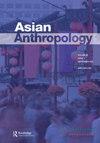希望国家政策和“基于政策的抵抗”:中国矿业小镇良好社会的争议代表
Q2 Social Sciences
引用次数: 0
摘要
摘要随着人类学对抵抗研究的兴趣死灰复燃,我展示了抵抗如何建立在坚定遵守政府政策的基础上,从而在意识形态上加强国家。尽管人类学家通常将政策概念化为控制的政治技术,但中国学者已经表明,公民也可以出于抵抗的目的挪用政策。这些不同的政策观点意味着国家和社会之间的二分法。然而,根据中国矿业小镇(平安)农民和工人抵抗经历的民族志数据,我探讨了平安人对国家政策的想象如何隐含着一种“国家-家庭”关系,在这种关系中,“基于政策的抵抗”受到政治-道德关系的约束。尽管政策限制了社会生活,但平安农民和工人仍将国家政策作为抵抗的工具。他们并不认为国家政策提供了抵抗的机会,但也将其视为希望中央国家政策能给他们带来幸福家庭生活的资源。我用三个案例来说明这一点,在这三个案例中,平安人对国家政策的空间想象与“家庭”的概念联系在一起(家). 这篇文章最后反思了“拒绝”的概念,认为那些基于政策的抵抗者拒绝承认地方政府是有效的政策执行者,而是接受中央国家是仁慈的政策制定者,这给了他们希望,让他们想象一个美好的社会。本文章由计算机程序翻译,如有差异,请以英文原文为准。
Hoping for state policy and “policy-based resistance”: contested representations of a good society in a Chinese mining town
Abstract Following the resurgence of anthropological interest in resistance studies, I show how resistance can be based on firm adherence to government policies, and can thus ideologically strengthen the state. Though it is common for anthropologists to conceptualize policies as political technologies of control, Chinese scholars have shown that policies can also be appropriated by citizens for purposes of resistance. These different views on policies imply a dichotomy between the state and society. However, drawing on ethnographic data on the resistance experiences of peasants and workers in a Chinese mining town (Pingan), I explore how Pingan people’s imagination of state policy implicates a “state-family” relationship in which “policy-based resistance” was bounded by a political-moral nexus. Pingan peasants and workers used state policies as a tool of resistance despite the policy restrictions placed on social life. They did not see state policies as offering opportunities of resistance but also saw them as resources for hoping the central state’s policies would bring them a happy family life. I illustrate this with three case studies in which Pingan people’s spatial imaginations of state policies connect to the notion of “family” (家). This article concludes by reflecting on the concept of “refusal,” arguing that those who employed policy-based resistance refused to acknowledge the local government as effective policy enforcer but accepted the central state as a benevolent policy-maker, offering them hope and allowing them to imagine a good society.
求助全文
通过发布文献求助,成功后即可免费获取论文全文。
去求助
来源期刊

Asian anthropology
Social Sciences-Anthropology
CiteScore
1.60
自引率
0.00%
发文量
25
期刊介绍:
Asian Anthropology seeks to bring interesting and exciting new anthropological research on Asia to a global audience. Until recently, anthropologists writing on a range of Asian topics in English but seeking a global audience have had to depend largely on Western-based journals to publish their works. Given the increasing number of indigenous anthropologists and anthropologists based in Asia, as well as the increasing interest in Asia among anthropologists everywhere, it is important to have an anthropology journal that is refereed on a global basis but that is editorially Asian-based. Asian Anthropology is editorially based in Hong Kong, Taiwan, and Japan, but welcomes contributions from anthropologists and anthropology-related scholars throughout the world with an interest in Asia, especially East Asia as well as Southeast and South Asia. While the language of the journal is English, we also seek original works translated into English, which will facilitate greater participation and scholarly exchange. The journal will provide a forum for anthropologists working on Asia, in the broadest sense of the term "Asia". We seek your general support through submissions, subscriptions, and comments.
 求助内容:
求助内容: 应助结果提醒方式:
应助结果提醒方式:


